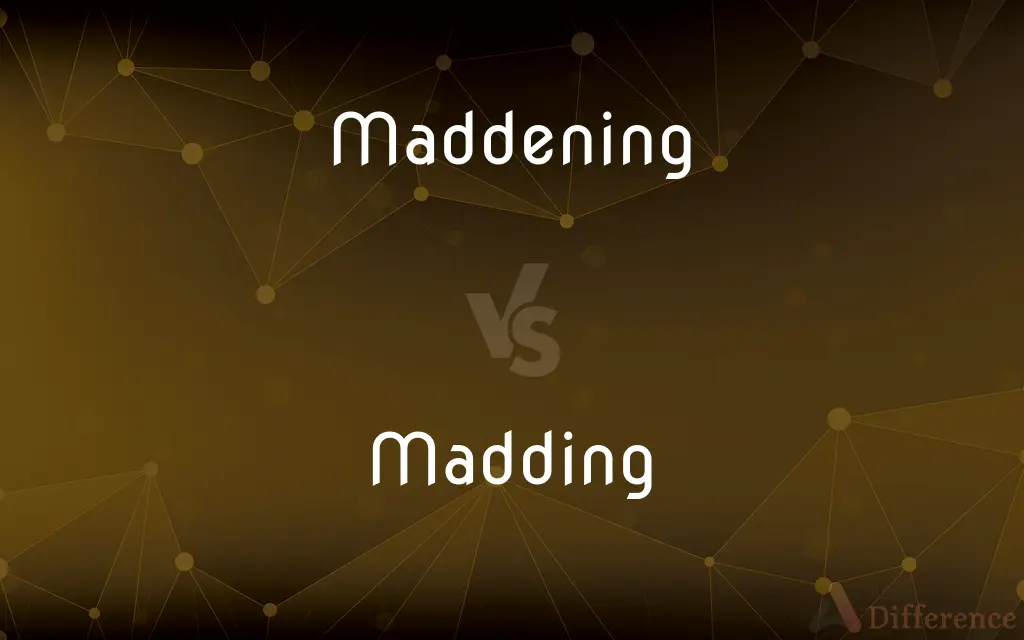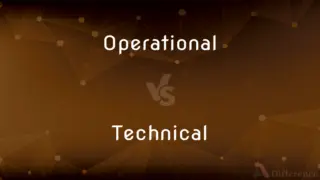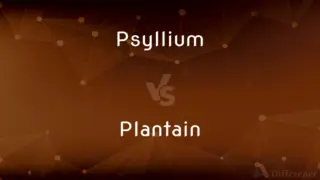Maddening vs. Madding — What's the Difference?
By Fiza Rafique & Urooj Arif — Updated on May 8, 2024
"Maddening" refers to something causing extreme annoyance, while "madding" describes a frenzied or frantic crowd, often used in poetic contexts.

Difference Between Maddening and Madding
Table of Contents
ADVERTISEMENT
Key Differences
"Maddening" is often used to describe situations, events, or behaviors that are extremely irritating or frustrating. This adjective conveys a sense of being driven to madness. On the other hand, "madding" is a less common term primarily found in literary or poetic contexts, suggesting a wild, frenzied state among groups of people.
The use of "maddening" can apply to a wide range of scenarios from a maddening noise that prevents concentration to a person's maddening indifference to rules. Whereas "madding" is typically confined to describing scenes or settings, like a "madding crowd," where there is chaos or lack of control.
"Maddening" evokes a personal response; it's about something that affects one's mental state deeply. In contrast, "madding" describes an external scene, particularly the collective behavior of a crowd.
In modern usage, "maddening" is more prevalent and understood across various contexts, from casual conversations to formal writings. "Madding," however, might require clarification or context as it is not widely recognized outside of certain literary references.
Although both terms share a root in "mad," their applications diverge significantly. "Maddening" focuses on the effect of driving one mad, while "madding" focuses on the state of being mad, particularly in a collective sense.
ADVERTISEMENT
Comparison Chart
Definition
Causing extreme annoyance
Pertaining to a frenzied crowd
Usage Frequency
Common
Rare, mostly literary
Contextual Usage
Broad (any irritating situation)
Specific (crowds, poetic scenes)
Emotional Connotation
Individual frustration
Collective frenzy
Examples
Maddening noise, maddening process
Madding crowd, madding throng
Compare with Definitions
Maddening
Likely to drive someone to madness.
Her maddening indifference to the schedule frustrated everyone.
Madding
Used to describe intense collective activity.
She was lost in the madding chaos of the market.
Maddening
Causing great annoyance or frustration.
The maddening delay at the airport was unbearable.
Madding
Belonging to a frenzied or chaotic crowd.
He wanted to escape the madding crowd and find some tranquility.
Maddening
Provoking intense irritation.
He found the puzzle maddening and couldn't complete it.
Madding
Characterized by wild or disorderly behavior.
The festival was filled with a madding throng.
Maddening
Aggravating beyond tolerance.
The maddening inconsistencies in the data were confusing.
Madding
Pertaining to a group in a frenzied state.
The madding roar of the stadium was exhilarating.
Maddening
Extremely irritating.
The maddening hum of the old fan made it hard to focus.
Madding
Literary term for a tumultuous crowd.
The poet spoke of the madding crowd's ignoble strife.
Maddening
To make angry; irritate.
Madding
In a state of frenzy; frenzied
"far from the madding crowd's ignoble strife" (Thomas Gray).
Maddening
To cause (someone) to go mad; drive to madness.
Madding
(archaic) Affected with madness; raging; furious.
Maddening
To become infuriated.
Madding
Present participle of mad
Maddening
Causing frustration or anger.
Madding
Affected with madness; raging; furious.
Far from the madding crowd's ignoble strife.
The madding wheelsOf brazen chariots raged.
Maddening
Leading to insanity.
Maddening
Present participle of madden
Maddening
Extremely annoying or displeasing.
Maddening
Extremely annoying or displeasing;
His cavelier curtness of manner was exasperating
I've had an exasperating day
Her infuriating indifference
The ceaseless tumult of the jukebox was maddening
Common Curiosities
Can "madding" be used in everyday conversation?
While it can be used, it might not be readily understood without context due to its literary nature.
What is an example of a maddening situation?
A computer crashing repeatedly can be described as maddening.
How is "maddening" commonly used?
It's used to describe irritating situations, noises, or behaviors.
Is "maddening" related to actual madness?
It figuratively suggests something is so irritating it could drive one mad.
Are "maddening" and "madding" interchangeable?
No, they are used in different contexts and convey different meanings.
What does "maddening" mean?
It refers to something that causes great annoyance or frustration.
What does "madding" mean?
"Madding" refers to a frenzied or chaotic state, especially among crowds.
Where is "madding" typically found?
It's mostly used in literary contexts, like poetry.
Does "madding" imply violence?
Not directly; it more broadly refers to wild, frenzied behavior.
What is an example of a madding scene?
"The poet spoke of the madding crowd's ignoble strife."
Share Your Discovery

Previous Comparison
Operational vs. Technical
Next Comparison
Psyllium vs. PlantainAuthor Spotlight
Written by
Fiza RafiqueFiza Rafique is a skilled content writer at AskDifference.com, where she meticulously refines and enhances written pieces. Drawing from her vast editorial expertise, Fiza ensures clarity, accuracy, and precision in every article. Passionate about language, she continually seeks to elevate the quality of content for readers worldwide.
Co-written by
Urooj ArifUrooj is a skilled content writer at Ask Difference, known for her exceptional ability to simplify complex topics into engaging and informative content. With a passion for research and a flair for clear, concise writing, she consistently delivers articles that resonate with our diverse audience.
















































